Inspiring Reflections and Future Visions: City Year Little Rock at the 30th AmeriCorps Anniversary Summit
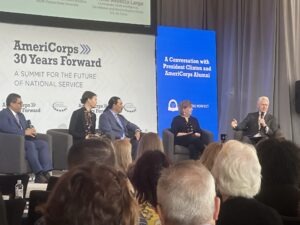
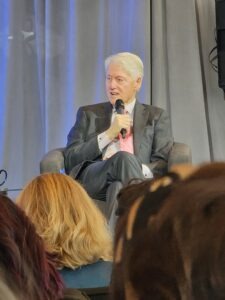
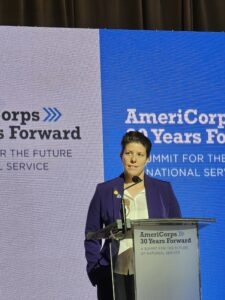
A few staff members and City Year Little Rock corps leaders attended the 30th Anniversary AmeriCorps Summit held in Little Rock at the Clinton Presidential Center. The Summit covered many facets of the impact of AmeriCorps on our communities and nation. Still, the one question tackled throughout the sessions was: what do we hope for AmeriCorps in the next 30 years? We heard from many people with various experiences with AmeriCorps and how their experiences impacted their lives and careers. It was an inspiration to listen to what all of the prominent people in our AmeriCorps community have been able to experience in years past and what they see for the coming years.
It opened with a message from Michael Smith, CEO of AmeriCorps, about the importance that AmeriCorps members have had and continue to have on the state of our nation. He spoke on the development of AmeriCorps during these last 30 years, with the first class of members being just 20,000 and developing into today’s class of 200,000 with over one million AmeriCorps alums. He spoke on how service in AmeriCorps shows the power of ordinary citizens to create extraordinary impact – “it’s not a moment, it’s a movement.” Service can transform not only those being served but also those serving.
The Summit consisted of speeches and discussions in various formats: panels, testimonials, and messages from multiple influential people in our nation. Each one gave us more perspective on how wide and far the scope of the Americorps experience can be. The first introduction we got to these perspectives was in the panel titled “Opening Session – A Conversation with President Clinton and Americorps Alumni,” in which they were asked about their service and its impact on their career. The panel was moderated by former President Bill Clinton and highlighted former Americorps members: AnnMaura Connolly, President of Voices for National Service; Leroy “J.R.” LaPlante, Associate Vice President of the Wokini Initiative at South Dakota State University; Colonel Rebecca Lange, Commander of the 659th Intelligence, Surveillance, and Reconnaissance Group in the U.S. Airforce; Kyle Kimball, Vice President of Government Relations and Community Engagement at New York University; and Domingo Morales, Founder of Compost Power. Each one came from such different backgrounds and used their experiences in Americorps to help steer them into exceptional paths centered around service to their communities.
J.R. used his experience in South Dakota Access to Justice as an Americorps fellow and a long list of achievements to eventually lead him to his journey assisting the Wokini Initiative, which provides opportunities for secondary education in South Dakota to American Indian students. He uses a strengths-based approach to improve outcomes for these students on campus and beyond. Colonel Rebecca Lange joined because she was getting no help for her secondary education and was motivated by the educational opportunities Americorps can provide. She was called to participate after watching a state address about Americorps. Kyle Kimball joined after attending a meeting with Harvard Students for North Hampshire and decided to take a year off for Americorps, stationed in Birmingham, Alabama, for Birmingham AIDS outreach. Domingo Morales was in his home of New York City as a teenager looking for a purpose and a way to provide for his family when he found a flyer for Americorps that advertised that all he needed was to be 18-24 years of age with a diploma and a desire to make a difference to be able to serve. He eventually found a passion for the farming process through his work. He created a solution to the lack of sustainable food sources for impoverished communities in New York City: Compost Power. They all went on to use their service experience in amazing ways. It was truly moving to hear from people who started out just like me and see all they’ve done since. The panel ended with a question asking the speakers about their vision for Americorps’ next chapter. Connely shared her sentiment that this country is in a time in which we need now more than ever to see love and hope in action, which she sees in Americorps. Clinton finishes the discussion with a call to action for us as a nation to solve our problems and see opportunities.
In the next panel titled, “Leveraging Americorps as a Diverse and Mission-Oriented Talent Pipeline,” we hear from Alice Kwan, Principal of Deloitte Consulting, Mayor of Wrightsville, Arkansas, Derrick Rainey, Amy Sovocool, CEO of Conservation Legacy, and Nyjeer Wesley Program Laison for Federal Emergency Management Agency (FEMA). They discuss how their connections and experiences with Americorps help them pave pathways to incredible successes and how they are helping others in Americorps achieve the same. Kwan shared her experience as a career catalyzer working with City Year to provide interview prep, testimonials in the field, and resources to offer more exciting pathways for their lives after service. Wesley discussed the pipeline that FEMA Corps provides their service members within the company so that they can grow up and out while remaining committed to service. Sovocool named grit, purpose, and a uniqueness that can only be gained through service experience in Americorps that can translate to careers outside service. She said this “uniqueness” can be described as a sense of resiliency and clear purpose in regard to both life and career. Lastly, Mayor Rainey called back to his time in service, emphasizing the “double-bottom line” of City Year and Americorps, which is to have an open heart and mind and get things done. He attributes his motivation throughout his career to these things.
Later in the day, in the panel titled “The Americorps Experience and Higher Education: A Leap Year, not a Gap Year,” the panelists discuss the connection between Americorps service and higher education opportunities and all the resources and support Americorps can provide to those seeking higher education. The panel was moderated by Dr. Victoria Defrancesco Soto, Dean of the Clinton School of Public Service. It highlighted three people who have dedicated their lives to helping students in higher education institutions: Mark Gearan, President of Hobart and Wiliam Smith College; Secretary John King, Chancellor of the State University of New York; and Flor Romano, Associate Director of Career Pathway Connections at L.A. Promise Fund. The speakers discuss how student funding and financial aid solve the gap in the ability to serve as a young person and access higher education as a young person. They spotlighted the opportunities for service members and alums to apply to higher education institutions for free, the 16 schools recognized as national service schools, the implementation of FAFSA completion corps, and financial awards. Finally, they discuss what service can do for students. It informs communities in different ways; it allows young people to give back to their communities contribute to society, and prepares them to engage civically with their communities. The discussion ends with a call to action to get more Americorps alums in the classroom and to get state and local governments to scale up the state-level service corps.
The final panel, which was moderated by Alan Khazei, Co-chair of More Perfect and Co-founder of City Year, was titled “Americorps as a Community Asset” and discussed the many ways in which Americorps provides support for the communities they serve and the nation as a whole and what the future for Americorps might look like in the coming thirty years. The panel honored three speakers: Kaira Esgate, CEO of America’s Service Commissions; Julie Gehrki, Vice President of Philanthropy at Walmart; and Fagan Harris, Chief of Staff at the Office of Maryland Governor Wes Moore. The speakers discuss the potential that more community service engagement can have on those in them. Harris discusses the success he has seen in Baltimore with implementing the scaled-up service of Baltimore Corps. They are forming deeper connections around service and giving communities ownership of their problems and solutions. Gehrki said that from her experience at Walmart, she could see unique values from Americorps service members: practicality, empathy, understanding, lived experience, pragmatism, and ability to connect dots and solve problems that propel them forward. Esgate was able to see that with 75 percent of Americorps funding to state service commissions, they got Math and Reading Corps, Washington Service Corps, and others helping with Covid, Refugee Rise program in Iowa, among other successes.
Attending the Summit was an honor for everyone at City Year Little Rock who could participate. It is not often that people from so many different walks of life get the opportunity to learn from and network with some of the most influential people in our nation, who are all focused on one thing: service. This experience is not something anyone who attended will soon forget. This is the start of a very successful next thirty years for Americorps.
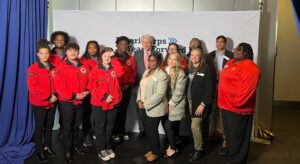
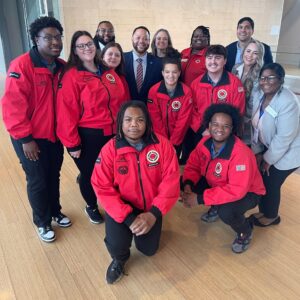
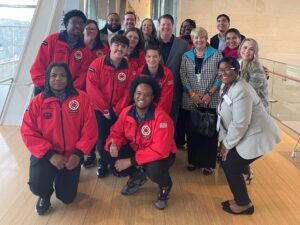
Related stories
Derrick Rainey wears many hats. He’s the current mayor of Wrightsville, Arkansas; a youth pastor; the small business coordinator for...
Read more about Alumni Profile: Spotlight on Derrick RaineyOne There will be days that will test you, and you’ll contemplate quitting. But you persevere for a reason. One...
Read more about 5 Things I Wish I Knew Before Joining City YearBlack History Month, to me, means celebrating. If you were to ask what it meant to me when I was...
Read more about What Black History Month Means to MeFor far too long, Black American History has been relegated to the margins of the American narrative, unjustly dismissed as...
Read more about The Importance of Black American History to Me















